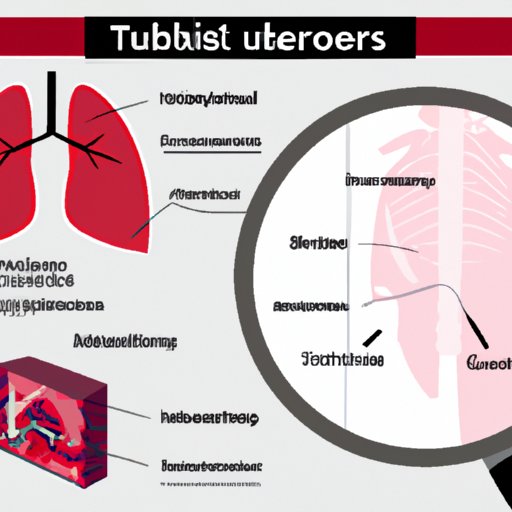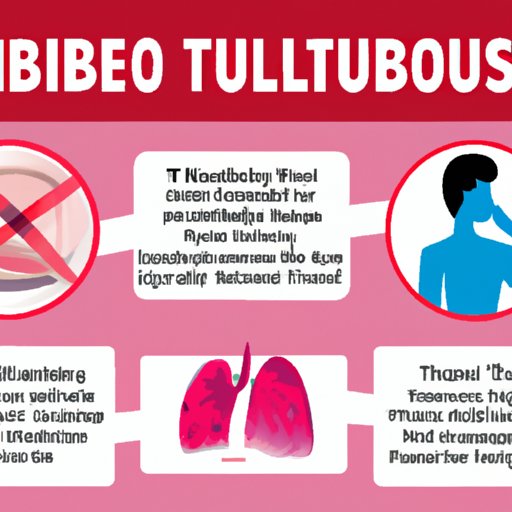
Introduction
Tuberculosis is an infectious disease that has plagued humanity for centuries. Today, it continues to be a major public health concern, causing a significant burden on healthcare systems worldwide. In this article, we will explore the symptoms of tuberculosis to help readers recognize the early signs of the disease early and facilitate prompt treatment.
If you or someone you know is experiencing any of the symptoms of tuberculosis, it is crucial to seek medical attention promptly.
Understanding Tuberculosis: Signs and Symptoms
Tuberculosis, commonly referred to as TB, is an infectious disease that primarily affects the lungs, but can also spread to other parts of the body. TB is caused by the bacterium Mycobacterium tuberculosis and is transmitted through the air by coughing or sneezing.
When someone contracts TB, the bacteria begin to multiply and form a small growth known as a tubercle. If left untreated, the tubercle can grow and burst, causing further damage to the lungs and other organs.
Knowing the signs and symptoms of TB is crucial in detecting the disease early and preventing its spread.
Tuberculosis 101: Common Symptoms to Know
Here are the ten most common symptoms of tuberculosis:
- Coughing that lasts for more than three weeks
- Chest pain
- Coughing up blood or sputum
- Fever
- Night sweats
- Weight loss
- Fatigue
- Lack of appetite
- Breathing difficulties
- Swollen lymph nodes
If a person experiences any of these symptoms, they should seek medical attention promptly.
Spotting the Early Signs of Tuberculosis
The early symptoms of TB can be mild and might not be immediately noticeable. These early symptoms might include:
- Mild cough
- Fever
- Night sweats
- Loss of appetite
- Fatigue
If someone experiences any of these early symptoms and has been exposed to TB, they should seek medical attention promptly.
What Are the Symptoms of Tuberculosis and When to Seek Medical Help
If someone experiences any of the symptoms of tuberculosis, they should seek medical attention promptly. To prepare for a medical appointment, it is helpful to make a note of any symptoms, when they started, and how severe they are.
The doctor may order various tests to diagnose tuberculosis, such as a chest X-ray, a sputum test, or a skin test.
Learning the Different Symptoms of Tuberculosis for Early Detection
Differentiating TB from other respiratory illnesses can be challenging, as the symptoms can be similar. However, it is essential to be self-aware and note any changes in symptoms or their severity and discuss them with your healthcare provider.
Early detection is crucial in the treatment of TB, and it is essential to monitor any respiratory illnesses that persist longer than usual.
Tuberculosis: Recognizing the Symptoms and Preventing Its Spread
TB is a highly infectious disease that spreads through the air when someone with the active disease coughs or sneezes. To prevent the spread of TB, it is essential to practice good personal hygiene, such as frequently washing hands, covering the mouth and nose when coughing or sneezing, and staying home if feeling unwell.
Screening for TB is also crucial in preventing its spread. People at high risk of TB should be screened and, if necessary, treated promptly to prevent the spread of the disease. If someone is diagnosed with TB, they should take precautions to avoid transmitting the bacteria to others, such as staying home and avoiding close contact with others.

How to Identify Tuberculosis with Its Symptoms: A Guide for Everyone
Identifying the symptoms of tuberculosis is vital for early detection and prompt treatment. It is essential to be self-aware and note any changes in symptoms or their severity. If any of the symptoms persist, it is crucial to seek medical attention promptly.
Good personal hygiene, screening for TB, and early detection are essential in the prevention and treatment of TB. We should all take responsibility to prevent the spread of this highly infectious disease.
Conclusion
Tuberculosis is a highly infectious disease that continues to be a major public health concern worldwide. Knowing the symptoms of TB is crucial in detecting the disease early and preventing its spread. It is essential to seek medical attention promptly if any of the symptoms persist, stay home when feeling unwell, and practice good personal hygiene to prevent the transmission of the disease.
For more information on TB and how to prevent its spread, please consult your healthcare provider or local public health agency.





